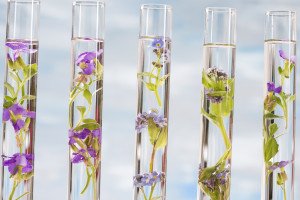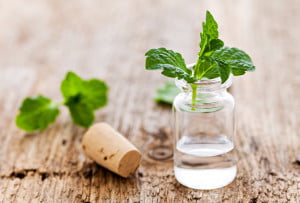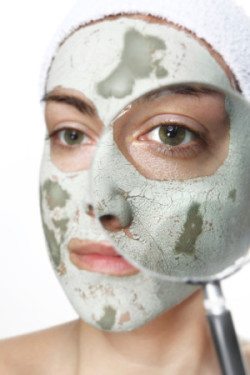Essential oils are hot right now.
From treating infections through to anxiety and poor sleep, they are said to be a natural cure for many health conditions.
But just how well do essential oils work?
Often times it’s unwise to take the word of those who actively promote and sell them… making an unbiased answer to this question hard to come by.
This article is an objective, sales-free look at the most common essential oil uses, from an evidence-based perspective.
What are essential oils and aromatherapy?

An essential oil (also known as a volatile oil or ethereal oil) is a concentrated liquid that contains a plant’s chemical properties.
The oil is termed “essential” in that it contains the “essence of” the plant’s fragrance and aroma; it’s chemical compounds. These compounds are typically extracted by crushing and distilling the plant, then combining them with a carrier oil so they can be preserved for use.
Each type of essential oil has a different chemical composition that affects how it smells, how it is absorbed, and how it effects us. Some of the more popular plant fragrant essences include peppermint, tea tree, wintergreen, lavender, oregano and bergamot.
Aromatherapy
The practice of using essential oils for the purpose of healing is called Aromatherapy.
The most common aromatherapeutic uses of essential oils are massaging into the skin or inhalation of vapours. Both methods allow the oil’s plant chemical compounds to cross into the bloodstream (1).
Summary: An essential oil is a mixture of a plant’s chemical compounds (its fragrance) with a carrier oil. Each variety has unique properties and effects depending on the plant from which it was extracted. Essential oils are most commonly applied by massaging into the skin or inhalation of vapours, known as aromatherapy.
Essential oils can help fight bacteria and viruses

The use of essential oils is rare in evidence-based medicine.
But a renewed interest in its therapeutic use has come about due to the apparent rise of antibiotic-resistant bacteria (2).
To my surprise, there has actually been quite a lot of bench top studies investigating the anti-microbial effects of essential oils. In petrie dishes, they appear to suppress or kill many common bacterial and fungal strains, such as E.Coli and Candida albicans (3).
It is thought that peppermint oil and tea tree oil make a useful antiseptic mouthwash, and could help relieve a sore throat too. On the other hand, lemongrass oil and lavender oil appear to have the strongest anti-fungal properties for treating yeast infections (4, 5, 6, 7, 8).
Researchers also found that both allspice oil and lemongrass oil have strong anti-viral effects. Viruses cannot be treated with antibiotics (9, 10).
This may all sound very promising, but there is only so much we can take away from test tube studies. A shot of tequila will kill bacteria in a petri dish too. Same if you were to swish it around your mouth.
This is why it’s a long stretch to suggest the use of essential oils will kill harmful bacteria in your body, improve immune function or “eliminate toxins”. Researchers acknowledge this fact and the need for actual human studies that can evaluate the relevance of these results.
Summary: Test tube studies show that essential oils have various anti-microbial properties, particularly against common bacterial and fungal strains. Whether these benefits would carry over in the human body has not been investigated.
Essential oils for anxiety and other mental health conditions

Rodent studies have found that essential oil inhalation under stressful or painful conditions led to noticeable neurological and behavioural responses (11, 12, 13).
This suggests the fragrance compounds may have a direct affect on the brain, at least in mice. The potential psychological effects of essential oils in humans has also been researched to some extent. Studies tend to involve cancer or heart surgery patients in hospital.
In the year 2000, a large review concluded aromatherapy is ineffective for treating anxiety (14)… and it seems opinion has not changed since.
Apart from one study which was not blinded (and therefore likely to be biased), the latest trials using oxygen masks come to the same conclusion. Inhalation of essential oils has no clinical effects on anxiety levels in patients, at least after heart surgery or stem cell transplantation (15, 16, 17, 18).
Other studies focused on different mental health conditions or topical treatments have highly conflicting results. It seems that for every study that found a positive effect, there is one that didn’t (19, 20, 21, 22).
If you still aren’t convinced, a recent review of 201 relevant studies concluded that out of the 10 that were actually good quality, aromatherapy does not improve high blood pressure, depression, anxiety, pain relief, or dementia (23).
Given this weight of evidence, to suggest essential oils may help prevent or treat neurological conditions like Alzheimer’s disease or Parkinson’s disease is far-fetched.
Summary: The weight of evidence has found that inhalation or topical application of essential oils does not improve symptoms of anxiety or related mental health conditions. There is no convincing research to indicate they help with neurological conditions like Alzheimer’s disease.
Essential oils for sleep

Alongside exercise and diet, quality sleep is crucial for good health.
The weight of evidence indicates that lavender oil may be beneficial for relaxation and sleep quality.
Rodent studies have shown several essential oils, particularly lavender oil, has strong sedative effects. It reduces mobility in mice by up to 22%, and the effects remained even if the mouse was over-agitated with caffeine (24).
Looking at human studies, lavender inhalation has been linked to improved sleep quality and duration in multiple studies (25).
Note that no benefits have been seen with topical lavender oil treatment.
Summary: Lavender oil has been shown to have powerful sedative effects on mice. Human studies have linked lavender oil odour, but not topical treatment, to improved sleep quality and duration.
Essential oils for acne
Acne is a common inflammatory skin condition in Western countries.
It affects 80-90% of teenagers, half of whom will continue to have symptoms into adulthood (26).
Surprisingly there has been only two human trials on acne treatment with essential oils, namely tea tree oil. The most recent study included 60 patients with mild to moderate acne over a 45 day period. Half received a 5% tea tree oil gel while the other half (the control group) received a placebo gel without any active ingredients (27).
The 5% tea tree oil was effective in reducing both inflammatory and non-inflammatory acne lesions compared with the placebo gel. Researchers speculate this was due to the reported anti-bacterial and anti-inflammatory properties of tea tree oil.
The older study found that both 5% tea tree oil and 5% benzoyl peroxide (conventional acne treatment) significantly improved acne symptoms in 124 patients, though tea tree oil was slower to take effect (28).
While it is likely not a strong stand-alone acne treatment, tea tree oil may help as an addition to current acne medications. But it would be nice to see if the results can be repeated in another double-blinded clinical trial before solid recommendations are given.
Summary: There has only been two clinical trials on acne and essential oils so far. In both studies, 5% tea tree oil reduced both inflammatory and non-inflammatory acne lesions. The results are very promising, but repeat studies are needed to confirm this.
Essential oils for headaches

Two human studies by the same research team have shown that topical application of peppermint oil may effectively reduce headache symptoms.
The first study on 32 patients found that a 10% peppermint oil preparation provided significant pain relief when sponged on the forehead and temples (29).
The second was more well-designed and studied four headache attacks per person, in a total of 41 patients. 10% peppermint oil was shown to be just as effective as 1000 mg acetaminophen (conventional headache drug), significantly reducing headache intensity after 15 minutes (30).
Results are promising, and it seems like a largely harmless alternative to aspirin or paracetamol.
Summary: Two studies have shown 10% peppermint oil can help relieve headache symptoms. It may be as effective as conventional drugs, and works in as little as 15 minutes.
Are essential oils safe?

Natural does not automatically mean safe.
Essential oils are no exception to the rule.
Just like any other substance with pharmacological effects, in some individuals they can cause dermatitis, allergic reactions and other dangerous side effects (8, 31).
A 2012 review published in the International Journal of Risk & Safety In Medicine found that lavender, peppermint, tea tree and ylang-ylang oil were the most common essential oils responsible for adverse effects. There was even one documented fatality (32).
Most essential oil varieties can be toxic when ingested and therefore should definitely not be taken orally if they aren’t designed for it. For example a teaspoon of carvacrol, an active ingredient in oregano oil, can be fatal to humans (33, 34).
The exception is if the oil comes in the form of a capsule or softgel, and is therefore designed to be ingested in a small and controlled dose. Typically it will be safe to ingest if you follow the instructions on the label.
Keep in mind that with so little published research on essential oils, there is no information to estimate what a safe dose might be, whether inhaled or applied on the skin. Can they be used safely in pregnant or breastfeeding women? When used as directed the risk is likely very low, but know that doses published by manufacturers are not based on any published evidence.
Additionally, the chemical composition of essential oil batches are never quite the same. Quality and concentration of the end product is influenced by the local geography and weather, season the plants were harvested, as well as processing, packaging and storing procedures.
Essential oils and aromatherapy are unregulated
While prescription drugs must undergo rigorous safety and effectiveness testing before being approved, essential oils are automatically classified as safe.
The International Organization for Standardization does have a set of standards for each type of essential oil, but these are not mandatory nor enforced by any law-makers.
The US Food and Drug Administration (FDA) considers essential oils a cosmetic, so manufacturers are not required to prove their effectiveness, purity or potency. The same goes for aromatherapy, which you are permitted to practice without a license.
As essential oils are unregulated, any claims they can treat a health condition classifies it as an unproven drug. This is illegal. The company Young Living Essential Oils had salespeople doing this, until the FDA caught up with them.
These regulatory loopholes – alongside dishonest multi-level marketing – has led to increasingly more eccentric and unproven health claims surrounding essential oils. Therefore, it’s important that we have a conservative mindset and do some of our own research – much like we should with dietary supplements –before buying into any great promises.
Summary: Essential oils are likely safe in small doses, but are known to cause adverse side-effects in some individuals. They should definitely not be ingested, and can even be fatal in high doses. The chemical composition of products varies between batches, and the quality and effectiveness are not regulated by any governing bodies.
Essential oils in a capsule or softgel
It has become increasingly common to ingest some essential oils in the form of a softgel or capsule.
In fact, there is a lot of growing scientific evidence for several varieties including peppermint oil and boswellia (frankincense).
Ingested in this way, following the instructions on the label, is much safer than ingesting oils that are designed to be applied to the skin.
To sum it all up… Do essential oils work?
As is the case with many “health” foods and supplements, essential oils are not useless, but their effects are extremely overrated.
This is to be expected when you consider that almost everyone who recommends them gets a commission.
Many varieties will likely help clean wounds and treat skin infections, but once we venture into more serious health claims the proof starts to fall short.
The strongest evidence available indicates that essential oils can help with headaches, sleep quality, and probably facial acne to a noticeable extent. Effects on anxiety, depression and other psychological health aspects are very underwhelming at this stage.
Claims they can help treat or cure cancer, heart disease, Alzheimer’s disease, asthma or any other serious medical condition are seriously exaggerated and unproven. And dangerous too, quite frankly.
Inhaling or applying essential oils to the skin in small doses is likely safe, but neither the oils nor the aromatherapy industry is regulated by a governing body. Some people will suffer adverse reactions and many varieties that weren’t made to be consumed orally can be highly toxic if ingested.
While this scientific perspective answers most questions, it cannot account for every single oil nor every single use… There is so much that has not yet been studied.
My best advice before you buy is to ask questions and think critically about how extreme the health claims are. If it sounds too good to be true, unfortunately it is.

